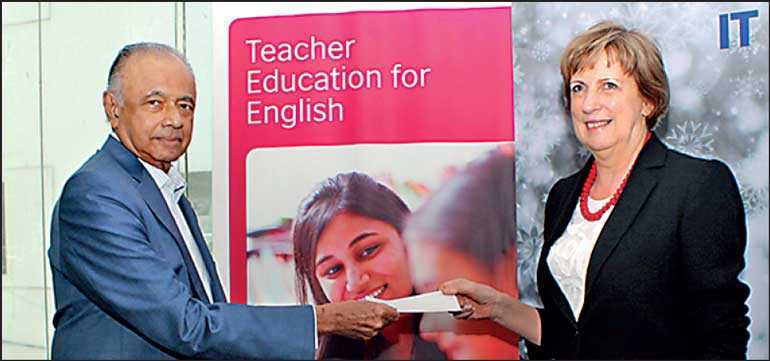Wednesday Feb 18, 2026
Wednesday Feb 18, 2026
Friday, 14 December 2018 00:00 - - {{hitsCtrl.values.hits}}

Earlier this year, in March, the British Council in Sri Lanka partnered with Ricky Mendis to announce the launch of a new project to improve the quality of English language education in Sri Lanka, namely the Teacher Education for English, a British Council delivered project, which would contribute to improving the levels of teaching and learning in Sri Lanka.
Ricky Mendis is a well-known corporate leader who shares the British Council’s vision of a thriving, globally connected Sri Lanka. His prompt response to the British Council’s appeal resulted in a magnanimous donation of Rs. 65.7 million to fund the entire project. “My decision to fund this program arose from my concern for the employability of intelligent, qualified young men and women, who are handicapped by their woeful lack of knowledge and use of the English language,” said Mendis. “A skilled workforce, capable of communicating with people of every country, for the future betterment of Sri Lanka, is my goal.”
The project’s goal is to enhance students’ access to good education and employment opportunities by improving the quality of the teaching of English, the language most commonly used in higher education and the private sector. The project is a solid example of the way in which industry and prominent individuals can contribute towards both the development of the skills of young people to support them in securing employment and to the enhancement of Sri Lanka’s economic development through the improvement of the quality of teaching.
The Teacher Education for English Project (TEE) complements the British Council’s Improving Teacher Education in Sri Lanka Project (ITESL), which focuses on the professional development and skills of teacher educators and principals. Both projects come under the British Council’s overarching TRANSFORM education program. TEE targets over 1,000 English language teachers and trainee English language teachers enrolled in the four National Colleges of Education in Kandy, Kalutara and Jaffna.
A team of six British Council trainers arrived in the country in January this year and are deployed in the four colleges. These trainers are working closely with college faculty to ensure that they also cover the regular curriculum in these colleges.
They are delivering face-to-face combined English language upgrade and teaching methodology to the trainee English language teachers in their colleges. This aims to raise the trainee teachers’ level of English and to develop their practical teaching skills by giving them a solid basis in teaching language for communication. In December 2018, 366 pre-service English teacher trainees completed an English for Teaching course with 59 Maths/Science/Primary Trainees also completing a General English course. The colleges have been overwhelmingly positive in the transformation they have seen with trainees in their teaching practice blocks as a result of the techniques and methods learnt on the course.
British Council Sri Lanka Country Director Gill Caldicott said, “We are very pleased and proud to be delivering this project to improve the teaching and learning of English in Sri Lanka. Ricky Mendis’ vision for a globally connected Sri Lanka with good levels of English will find resonance with employers and educationalists country-wide. A brilliant initiative by a leading entrepreneur.”
A key consideration for many employers is accessing a competent and qualified workforce with the necessary skills. The British Council is currently undertaking research to gain evidence of the importance of English as a key employability skill. TEE is an example of how a teacher education project can contribute to raising not only levels of language proficiency but also the acquisition of core skills (such as critical thinking, creativity and innovation, and communication) all of which are recognised by employers as needed for employment.
The engagement and investment of the corporate sector in supporting skills development (including English) is gaining ground. The British Council continues to highlight the importance of supporting education initiatives to employers’ groups, using TEE as an example of good practice.